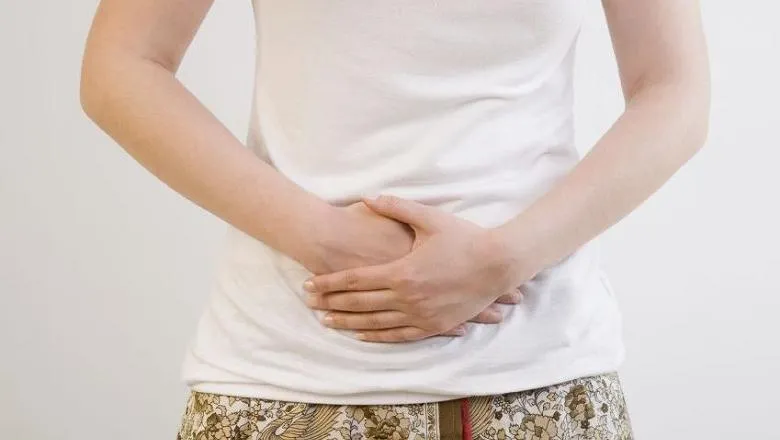26 April 2018
King's and IBS
Will Richard, Communications & Engagement Officer
As we come to the end of IBS awareness month, it seems an excellent opportunity to highlight King’s world-leading work to understand and treat this often debilitating condition.

Professor Kevin Whelan, School of Life Course Sciences, talks us through his research:
Irritable bowel syndrome (IBS) is a widespread condition that affects 5-10% of the UK population and which has a profound impact on their day-to-day lives: causing pain, bloating, diarrhoea and constipation. Nearly all people with IBS experience symptoms when eating specific foods, but for many years the best dietary approach to manage IBS has been unclear. Then in 2012 we published the first ever clinical trial of a new diet called the low FODMAP diet.
FODMAPs stands for fermentable oligosaccharides, disaccharides, monosaccharides and polyols. These are fermentable carbohydrates present in foods such as wheat, onions, beans, lentils, some dairy products and some fruits and vegetables. FODMAPs are fermented by bacteria in the gut to produce gas, which is one of the causes of abdominal pain and bloating in people with IBS.
Our initial research showed that the low FODMAP diet significantly improved symptoms in people with IBS but it also changed the balance of the bacteria in the gut. Since then other researchers have confirmed our findings and we now know that 50-80% of people with IBS will see an improvement in their symptoms when following the diet.
We have recently published the largest ever clinical trial of the low FODMAP diet in over 100 people with IBS. As well as showing that many people respond to this dietary treatment, the changes in gut bacteria can be partially prevented by using a probiotic supplement at the same time.
We have also shown that we can measure by-products of the gut bacteria to predict who will (and who wont!) get better when following the low FODMAP diet, meaning that in the future we may be able to target only those we know have a good chance of improving.
Despite these exciting findings, the low FODMAP diet should only be followed once general dietary principles have been exhausted and should only be followed for the short-term with the support of a dietitian.
As Professor Whelan mentions, there are lots of changes IBS suffers can make to their diet and lifestyle to help alleviate their symptoms. Dr Megan Rossi, also from the School of Life Course Sciences, shares some simple tips to help manage your IBS:
|
Dietary component |
Recommendation |
|
Dietary habits |
Chew your food well, don’t eat too fast, eat smaller portions and avoid eating a big meal before bed. |
|
Alcohol |
If drinking alcohol is related to your symptoms try restricting your intake. Alcohol is known to affect gut motility, acid secretion and many other symptoms. |
|
Caffeine |
If caffeine is related to symptoms try to restrict your intake. Behavioural changes (e.g. irritability, nervousness or anxiety) have been reported with higher caffeine intakes, and it can also affect gut motility. |
|
Spicy food |
If spicy food impacts your symptoms try to restrict your intake. Also note it maybe the FODMAPs components in the meal i.e. onion and garlic, rather than the chili. |
|
Fat |
If fat is related to symptoms during or after eating, assess fat intake and ensure it is not excessive. |
|
Fluid |
Aim for a total intake between 1.5-3L/day (preferably water). |
|
Milk and Dairy products |
If you suspect you’re sensitive to milk trial a low lactose diet (lactose being the fermentable carbohydrate found in many dairy products). But make sure you replace this with calcium-fortified alternatives. |
|
Dietary fibre |
Adding wheat bran to your diet could make symptoms worse. Linseeds may help relieve constipation (up to 2 tablespoons/day for a 3-month trial). Caution: consume fibre with plenty of fluid and gradually introduce it starting out with 1 teaspoon/day for the first week. |
|
FODMAPs |
These are fermentable carbohydrates found in a wide range of foods. If following the simple tips above does not help your IBS symptoms, ask your doctor to refer you to see a dietitian who can counsel you on following this diet. But remember, FODMAP-containing foods should be reintroduced into the diet and a low FODMAP diet should not be followed in the long-term. |
If a career in nutrition or dietetics interests you then King’s has a number of courses that can help. We are Europe’s largest centre for medical and professional healthcare education and ranked 16th in the world for Clinical, Pre-clinical and Health (Times Higher Education 2017 subject rankings).
To find out more please visit our online prospectus:
